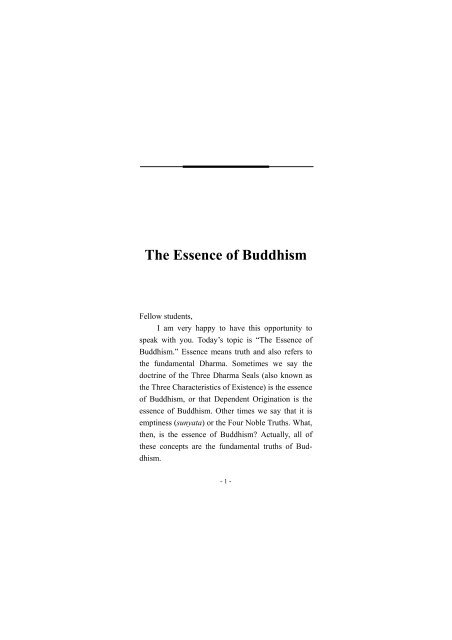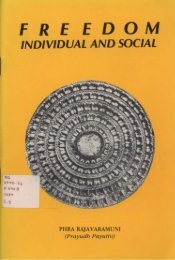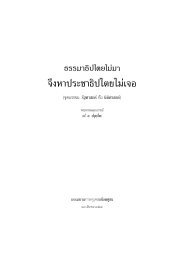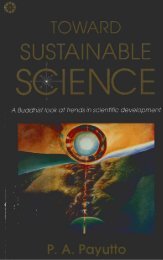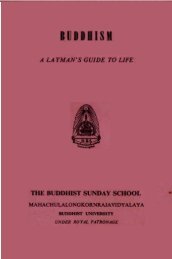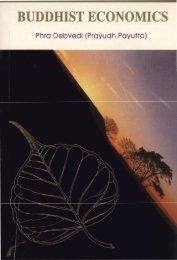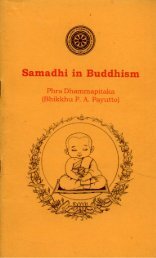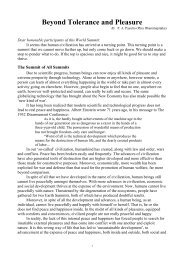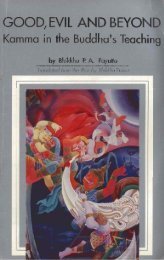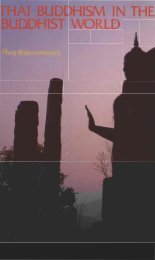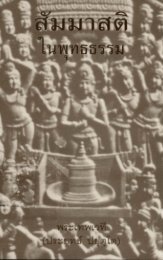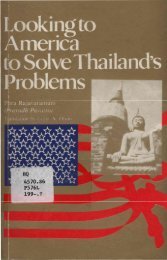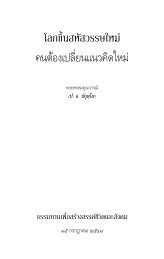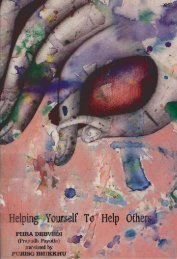The Essence of Buddhism
Create successful ePaper yourself
Turn your PDF publications into a flip-book with our unique Google optimized e-Paper software.
<strong>The</strong> <strong>Essence</strong> <strong>of</strong> <strong>Buddhism</strong><br />
Fellow students,<br />
I am very happy to have this opportunity to<br />
speak with you. Today’s topic is “<strong>The</strong> <strong>Essence</strong> <strong>of</strong><br />
<strong>Buddhism</strong>.” <strong>Essence</strong> means truth and also refers to<br />
the fundamental Dharma. Sometimes we say the<br />
doctrine <strong>of</strong> the Three Dharma Seals (also known as<br />
the Three Characteristics <strong>of</strong> Existence) is the essence<br />
<strong>of</strong> <strong>Buddhism</strong>, or that Dependent Origination is the<br />
essence <strong>of</strong> <strong>Buddhism</strong>. Other times we say that it is<br />
emptiness (sunyata) or the Four Noble Truths. What,<br />
then, is the essence <strong>of</strong> <strong>Buddhism</strong>? Actually, all <strong>of</strong><br />
these concepts are the fundamental truths <strong>of</strong> <strong>Buddhism</strong>.<br />
- 1 -
After the Buddha attained enlightenment, his<br />
first discourse, given at Isipatana (modern Sarnath)<br />
near Varanasi (modern Benares), was on the Four<br />
Noble Truths. This is the well known “First Turning<br />
<strong>of</strong> the Dharma Wheel” in Buddhist history.<br />
In <strong>Buddhism</strong>, those who attain enlightenment<br />
by listening to and learning about the Four Noble<br />
Truths and Dependent Origination are known as<br />
sravakas. Most people have the impression that<br />
sravakas are only concerned with their<br />
self-enlightenment. Because sravakas practice the<br />
Four Noble Truths, some people have the misconception<br />
that the Four Noble Truths only pertain to<br />
self-enlightenment. Actually, the Four Noble Truths<br />
are the fundamental teachings <strong>of</strong> <strong>Buddhism</strong>; they<br />
were realized, experienced, and taught by the Buddha<br />
himself. According to the Buddha’s teaching, the true<br />
nature <strong>of</strong> life and the universe is none other than the<br />
Four Noble Truths: suffering, the cause <strong>of</strong> suffering,<br />
the cessation <strong>of</strong> suffering, and the way leading to the<br />
cessation <strong>of</strong> suffering. <strong>The</strong> Four Noble Truths form<br />
the foundation <strong>of</strong> <strong>Buddhism</strong> from which all Buddhist<br />
scriptures are derived. <strong>The</strong> Avatamsaka Sutra, a<br />
Mahayana scripture, even has a special chapter de-<br />
- 2 -
voted to the Four Noble Truths. Thus, all Buddhists<br />
should learn the fundamental teachings <strong>of</strong> the Four<br />
Noble Truths.<br />
<strong>The</strong> word “Truth” in the Four Noble Truths<br />
carries with it the meanings <strong>of</strong> investigation and reality.<br />
<strong>The</strong> First Noble Truth is the “truth <strong>of</strong> suffering,”<br />
which is to see, through wisdom, that the world <strong>of</strong> the<br />
three realms 1 is like a burning house, full <strong>of</strong> suffering<br />
and lacking in joy. <strong>The</strong> Second Noble Truth is the<br />
“truth <strong>of</strong> the cause <strong>of</strong> suffering,” which is to realize,<br />
through wisdom, that the afflictions <strong>of</strong> greed, hatred,<br />
and ignorance are the causes <strong>of</strong> birth, death, and<br />
suffering. <strong>The</strong> Third Noble Truth is the “truth <strong>of</strong> the<br />
cessation <strong>of</strong> suffering,” which is to attain the true<br />
nature <strong>of</strong> nirvana through wisdom. <strong>The</strong> Fourth Noble<br />
Truth is the “truth <strong>of</strong> the path leading to the cessation<br />
<strong>of</strong> suffering,” which is to find the way to transcend<br />
the world <strong>of</strong> suffering to real happiness. <strong>The</strong> First and<br />
Second Noble Truths denote the causes and effects<br />
leading to the state <strong>of</strong> delusion in the mundane world.<br />
<strong>The</strong> Third and Fourth Noble Truths refer to the causes<br />
and effects leading to the state <strong>of</strong> enlightenment in the<br />
1 <strong>The</strong> world <strong>of</strong> desire, the world <strong>of</strong> form, and the world <strong>of</strong> formlessness.<br />
This is where the cycles <strong>of</strong> existence <strong>of</strong> all beings in six<br />
realms take place.<br />
- 3 -
supramundane world. <strong>The</strong> Noble Eightfold Path is the<br />
cause, which when practiced, will lead to the effect,<br />
the cessation <strong>of</strong> suffering. In the next section, I will<br />
describe the components <strong>of</strong> the Four Noble Truths in<br />
their respective order.<br />
I. <strong>The</strong> First Noble Truth: <strong>The</strong> Truth <strong>of</strong><br />
Suffering<br />
Personally, I have always believed that we<br />
should have a joyful, optimistic, and positive outlook<br />
on life. We should not constantly talk about suffering,<br />
walk around with knitted eyebrows and sad expressions,<br />
and be consumed by depression and misery.<br />
Some people may wonder: if we should seek joy in<br />
life, then why does <strong>Buddhism</strong> dwell so much on<br />
suffering?<br />
<strong>The</strong> purpose <strong>of</strong> talking about suffering in <strong>Buddhism</strong><br />
is for us to realize that all kinds <strong>of</strong> suffering<br />
exist in this world. Once we know the real nature <strong>of</strong><br />
suffering, we can find a way to end our suffering.<br />
Thus, understanding the existence <strong>of</strong> suffering is only<br />
part <strong>of</strong> the process. Learning how to put an end to it,<br />
thereby attaining liberation, is the ultimate purpose <strong>of</strong><br />
discoursing about suffering in <strong>Buddhism</strong>.<br />
- 4 -
Some <strong>of</strong> you may ask, “Why does <strong>Buddhism</strong><br />
say that life is full <strong>of</strong> suffering? I am not hungry for<br />
fame and wealth, nor am I hampered by love and<br />
emotion. My life is filled with happiness.” According<br />
to Buddhist scriptures, there are many forms <strong>of</strong> suffering.<br />
<strong>The</strong>re are three forms <strong>of</strong> suffering, eight types<br />
<strong>of</strong> suffering, one hundred and eight kinds <strong>of</strong> suffering,<br />
and even boundless and countless forms <strong>of</strong> suffering.<br />
All <strong>of</strong> them can be classified into either physical or<br />
mental suffering. Some people have less desire for<br />
material comforts; they are able to withstand the<br />
hardships <strong>of</strong> extreme weather and accept the pain <strong>of</strong><br />
impoverishment. <strong>The</strong>re are those who can rise above<br />
the attachment <strong>of</strong> emotions, handle the agony <strong>of</strong> being<br />
separated from loved ones, and tolerate the hassle<br />
<strong>of</strong> dealing with people they do not like. No one,<br />
however, is free from the pain that occurs at the end<br />
<strong>of</strong> one’s life when the five aggregates disintegrate.<br />
<strong>The</strong>refore, it does not make a difference whether or<br />
not we discuss suffering; everyone will experience<br />
some kind <strong>of</strong> suffering during his or her lifetime. If<br />
we can fully understand the sources <strong>of</strong> suffering and<br />
find ways to overcome them, we can then free ourselves<br />
from the deep sea <strong>of</strong> suffering and enjoy real<br />
- 5 -
happiness in life. What are the causes <strong>of</strong> suffering?<br />
A. <strong>The</strong> Causes <strong>of</strong> Suffering<br />
1. Disharmony between material objects and<br />
oneself<br />
<strong>The</strong> first cause <strong>of</strong> suffering is the disharmony<br />
between material objects and oneself. For example, if<br />
we live in a small house with many people, we may<br />
feel cramped and our crowded living conditions become<br />
a source <strong>of</strong> suffering. If the thickness <strong>of</strong> our<br />
pillows are uncomfortable, we may not be able to get<br />
any sleep, causing us to become restless and then<br />
short-tempered. To a student, even the height <strong>of</strong> the<br />
desk or the brightness <strong>of</strong> a light can be a distraction<br />
and a source <strong>of</strong> discomfort. <strong>The</strong>refore, dissatisfaction<br />
with such material things in our everyday lives can<br />
give rise to suffering.<br />
Not only can external material things be a<br />
source <strong>of</strong> suffering, but one’s skin, hair, and nails, if<br />
not taken care <strong>of</strong> properly, can also become filthy and<br />
become a source <strong>of</strong> distress. <strong>The</strong>re is a Chinese<br />
proverb that says, “Our hair is like three thousand<br />
strands <strong>of</strong> trouble.” Our lives are inextricably connected<br />
to material things.<br />
- 6 -
2. Disharmony between others and oneself<br />
<strong>The</strong> disharmony between other people and<br />
oneself can be the greatest cause <strong>of</strong> affliction. For<br />
example, we cannot always be with the people we<br />
love, yet we have to deal with people we dislike.<br />
Due to differences in our views and the ways in<br />
which we handle situations, conflicts arise and suffering<br />
ensues. Sometimes, even when we are careful<br />
and try not to <strong>of</strong>fend others, we still feel insecure<br />
when we see people whispering in a group because<br />
we assume that they are criticizing us behind our<br />
backs. Disharmony in our relationships with other<br />
people can diminish our aspirations and result in a<br />
sense <strong>of</strong> dejection and apathy. Thus, it is essential to<br />
establish harmonious relationships when we deal<br />
with others.<br />
3. Disharmony between one’s body and oneself<br />
Some people say, “Health is wealth.” Even if we<br />
possess all the treasures in the world and have unparalleled<br />
talents, we cannot accomplish anything<br />
without a healthy body. <strong>The</strong> body’s cycle <strong>of</strong> aging,<br />
sickness, and death is a natural phenomenon that no<br />
one can escape. A healthy person will become weak<br />
- 7 -
one day. A beautiful complexion will wither with age.<br />
Although we may flaunt our strength when we are<br />
young, our bodily organs will nonetheless start to<br />
deteriorate with the passing <strong>of</strong> time. Our eyesight will<br />
degenerate and our movements will slow down. Even<br />
a minor cold can confine us to bed for several days. A<br />
minor toothache can make us toss and turn in our<br />
sleep. Due to the disharmony between one’s body and<br />
oneself, different kinds <strong>of</strong> suffering occur one after<br />
the other.<br />
4. Disharmony between one’s mind and oneself<br />
<strong>The</strong> mind likes to take control and is like a king<br />
who rules over all his subjects. It is also like an untamed<br />
horse running wild, not willing to be controlled.<br />
When greed, hatred, and ignorance appear in our<br />
minds, though we try hard to keep them under control,<br />
they resurface time and time again. Our efforts seem<br />
so futile. Suffering arising from the disharmony between<br />
one’s mind and oneself can exceed the suffering<br />
brought about by disharmony in the body. When<br />
the body becomes ill, we can cure it with medicine,<br />
but when the mind is sick, even the best physician<br />
may not know what to do.<br />
- 8 -
We <strong>of</strong>ten hear people complaining to others:<br />
“You’re not listening to what I am saying!” Actually,<br />
the one who is not listening is not someone else, but<br />
our own mind. We <strong>of</strong>ten cannot stop our mind from<br />
wandering or creating mental afflictions. In this sense,<br />
our own mind can be our most formidable enemy. If<br />
we are constantly at odds with our own mind, suffering<br />
is inevitable.<br />
5. Disharmony between desire and oneself<br />
As human beings, it is impossible for us to be<br />
completely without desire. Desires can be wholesome<br />
or unwholesome. Wholesome desires are those such<br />
as wanting to become a sage or a Buddha, to excel in<br />
one’s career, to serve one’s community, or to benefit<br />
one’s country and fellow human beings. On the other<br />
hand, coveting material comforts, grasping for power<br />
and position, or craving the pleasure <strong>of</strong> a love affair<br />
are unwholesome desires and can lead to one’s<br />
downfall. Even wholesome desires, when not managed<br />
properly, can become overwhelming burdens,<br />
giving rise to numerous sufferings. How much more<br />
damaging are unwholesome desires! Thus, an important<br />
ingredient <strong>of</strong> success is knowing how to<br />
transcend one’s material desires.<br />
- 9 -
6. Disharmony between one’s view and oneself<br />
View refers to our way <strong>of</strong> thinking and our<br />
perceptions. While a lack <strong>of</strong> material things is tolerable,<br />
isolation due to one’s views and solitude <strong>of</strong> the<br />
spirit are the most difficult to bear. Since ancient<br />
times, many seekers <strong>of</strong> truth have found themselves<br />
having to travel the path <strong>of</strong> Truth alone. In fact, the<br />
Buddha almost considered entering into nirvana<br />
immediately after his enlightenment due to concern<br />
that living beings may not be able to understand the<br />
Truth he had realized.<br />
What typically can make us suffer are those<br />
views and concepts which are seemingly correct but<br />
are actually erroneous. During the Buddha’s time,<br />
some ascetics emphasized all kinds <strong>of</strong><br />
self-mortification. Some stood upside down in the<br />
forest; some sat dangerously close to fires; some<br />
submerged themselves in water; some refused to eat;<br />
and some went about naked. <strong>The</strong>y tried to use every<br />
type <strong>of</strong> method to torture their bodies so that they<br />
might gain liberation. Because <strong>of</strong> their erroneous<br />
views and false understanding, these ascetics inflicted<br />
physical pain on themselves unnecessarily.<br />
- 10 -
False views and understanding can cause us much<br />
suffering; they are the main stumbling blocks to our<br />
realization <strong>of</strong> the Truth.<br />
7. Disharmony between Nature and oneself<br />
According to history, our first human activities<br />
were struggles between Nature and ourselves. Since<br />
ancient times, the amount <strong>of</strong> suffering brought upon<br />
us by Nature has been incalculable. Natural disasters<br />
include hurricanes, earthquakes, fires, and floods.<br />
Too much rain has caused floods, completely covering<br />
low-lying areas. Too little rain has caused<br />
droughts, cracking the soil and making it impossible<br />
to plant crops. <strong>The</strong> sufferings we experience because<br />
<strong>of</strong> the disharmony between Nature and ourselves are<br />
clear and direct.<br />
<strong>The</strong> real root <strong>of</strong> suffering, whether caused by<br />
external factors such as material things and nature, or<br />
by internal factors such as the mind and our views,<br />
can be traced to our attachment to I and mine. According<br />
to <strong>Buddhism</strong>, the source <strong>of</strong> all suffering is the<br />
illusive I, which is but a combination <strong>of</strong> the five aggregates.<br />
<strong>The</strong> combination <strong>of</strong> the five aggregates—form<br />
and consciousness, together with the<br />
three mental activities <strong>of</strong> feeling, perception, and<br />
- 11 -
mental formation—constitutes life. <strong>The</strong> combination<br />
<strong>of</strong> these five factors exists only as long as the appropriate<br />
conditions are present. Nothing can exist unless<br />
the conditions for its existence are appropriate. Ordinarily,<br />
we live as if the body, which is made up <strong>of</strong><br />
the five aggregates, can exist eternally. We cling to<br />
the body as the real self, creating all kinds <strong>of</strong> cravings,<br />
which in turn lead to endless suffering. If we can see<br />
through the illusion <strong>of</strong> the “self” and realize the<br />
wondrous truth <strong>of</strong> emptiness, then we can transcend<br />
all suffering. <strong>The</strong> Heart Sutra says, “[<strong>The</strong> Bodhisattva]<br />
realizes the emptiness <strong>of</strong> the five aggregates<br />
and overcomes all suffering.”<br />
How can we realize the emptiness <strong>of</strong> the five<br />
aggregates and overcome all suffering? If we can<br />
realize the “selfless” nature <strong>of</strong> all things, (i.e., all<br />
things do not have an independent, permanent “self”),<br />
then we can realize the emptiness <strong>of</strong> the five aggregates.<br />
Once this is realized, suffering will be overcome.<br />
Let me illustrate what this means by the following<br />
example.<br />
Soccer is a very popular sport in the western<br />
world. Spectators at soccer matches <strong>of</strong>ten number in<br />
the tens <strong>of</strong> thousands. Among the spectators at one <strong>of</strong><br />
- 12 -
these matches was a man who was smoking while<br />
watching the game. He was so absorbed in the game<br />
that he did not realize his cigarette was too close to<br />
the man next to him and it burned a hole in his<br />
neighbor’s clothing. “Ouch, that hurts!” the neighbor<br />
yelled. <strong>The</strong> smoker then realized what he had done,<br />
and quickly apologized saying, “I’m so sorry!” <strong>The</strong><br />
person whose clothing was burned was so caught up<br />
in the excitement <strong>of</strong> the game he said, “It doesn’t<br />
matter. I’ll buy another one later.” How would you<br />
describe the neighbor’s state <strong>of</strong> mind? He was so<br />
focused on the match that he was in the state <strong>of</strong><br />
“non-self.” At this particular moment, watching the<br />
match was all that mattered to him. Even having a<br />
hole burned in his clothes was not worth a fight. If he<br />
were not so caught up in the game, such an incident<br />
would have developed into a big fight. But, when<br />
both parties focused all their attention on watching<br />
which side was winning or losing, the concept <strong>of</strong><br />
“self” no longer mattered. Imagine, just a soccer<br />
match is enough to capture our attention, so much so<br />
that we can forget the “self” and pay little heed to a<br />
burning pain. If we can always realize the emptiness<br />
<strong>of</strong> the five aggregates, we can definitely overcome all<br />
- 13 -
suffering.<br />
<strong>The</strong> existence <strong>of</strong> suffering is an undeniable truth.<br />
Thus, <strong>Buddhism</strong> continues to emphasize this fact and<br />
even goes one step further to find a way to overcome<br />
this problem. Actually, all modern studies, such as<br />
economics, medicine, and politics seek to improve<br />
our living standards and minimize human suffering.<br />
But, ordinary social welfare endeavors, such as aiding<br />
the poor and needy through the provision <strong>of</strong> food<br />
and clothing, can only give momentary relief. It<br />
cannot eradicate the roots <strong>of</strong> suffering. <strong>Buddhism</strong> not<br />
only emphasizes the eradication <strong>of</strong> our present suffering;<br />
more importantly, it teaches us how to eradicate<br />
the roots <strong>of</strong> suffering and liberate ourselves from<br />
the endless cycle <strong>of</strong> birth and death. Suffering in<br />
<strong>Buddhism</strong> is not pessimistic acceptance; it is something<br />
to be overcome and transcended positively.<br />
B. <strong>The</strong> Way to Overcome Suffering<br />
1. Strengthen our minds<br />
Someone may say, “Since I don’t believe in<br />
<strong>Buddhism</strong>, I’m not free from the suffering <strong>of</strong> birth,<br />
aging, sickness, and death. However, even though<br />
you believe in <strong>Buddhism</strong>, you’re still subject to the<br />
- 14 -
same suffering. What then is the use <strong>of</strong> believing in<br />
<strong>Buddhism</strong>?” This is true; believing in <strong>Buddhism</strong><br />
cannot prevent birth, aging, sickness, and death. But,<br />
when faced with such suffering, we will have greater<br />
strength to overcome it. When we come face to face<br />
with death, we will be able to accept it more openly<br />
and gracefully.<br />
Many <strong>of</strong> the great Arhats <strong>of</strong> <strong>Buddhism</strong> chose to<br />
live in the forest, by the water, or even in cemeteries,<br />
in order to realize their Buddha Nature. Many <strong>of</strong> the<br />
noble followers <strong>of</strong> Confucianism chose to leave the<br />
hustle and bustle <strong>of</strong> city life to lead a simple, honest,<br />
and tranquil life without any worldly desires. Most<br />
people find such a lifestyle difficult to accept, but<br />
these sages lived their simple lives happily and willingly.<br />
Why? This was because they had such high<br />
aspirations for themselves. <strong>The</strong>y had great confidence<br />
in their ideals, so they had the strength to endure<br />
the hardships and suffering that ordinary people<br />
cannot.<br />
A proper understanding <strong>of</strong> religion will give us<br />
the strength to overcome hardships willingly. Many<br />
people pray to all varieties <strong>of</strong> gods, asking for protection,<br />
money, wealth, health, and all the things that<br />
- 15 -
they deem “good” in life. This type <strong>of</strong> belief can only<br />
encourage greed. When these people cannot get what<br />
they want, they end up in despair. Some might even<br />
blame the gods for their suffering. This kind <strong>of</strong> belief<br />
system, which is based on greed, cannot give people<br />
strength.<br />
True Buddhists should not make unreasonable<br />
demands from the Buddhas or bodhisattvas. Instead,<br />
we should follow the way <strong>of</strong> the Buddhas and bodhisattvas<br />
and be willing to dedicate ourselves to the<br />
benefit <strong>of</strong> all beings. If we have this kind <strong>of</strong> belief and<br />
spiritual understanding, then we will have the<br />
strength to overcome the afflictions caused by misfortune<br />
and other difficulties. If we can accept with<br />
equanimity when others are either nice or hostile to us,<br />
and if we can look at worldly matters be they good or<br />
bad, in the same way, then we can confront suffering<br />
with ease and calmness. <strong>Buddhism</strong> may speak <strong>of</strong><br />
suffering in life, but I personally feel that life is full <strong>of</strong><br />
joy. Why? Although suffering exists in actuality, if<br />
we can use our strength to deal with it, then we can<br />
understand the real meaning <strong>of</strong> joy. <strong>The</strong> fruit which<br />
ripens after diligent cultivation tastes particularly<br />
sweet. <strong>The</strong> cultivation <strong>of</strong> a correct and strong faith is<br />
- 16 -
an important key that aids us in transcending suffering.<br />
2. Eradicate the root <strong>of</strong> suffering<br />
While the cultivation <strong>of</strong> a strong faith can aid us<br />
in transcending the pain <strong>of</strong> suffering, the eradication<br />
<strong>of</strong> the fundamental suffering <strong>of</strong> life and death is the<br />
ultimate goal <strong>of</strong> practitioners. We should not be<br />
complacent just because we can deal with suffering<br />
through our willpower, mental adjustment, and<br />
thinking. Even when we have control over the minor<br />
afflictions <strong>of</strong> life, if we are not completely free from<br />
birth, aging, sickness, and death, then the fundamental<br />
suffering due to the impermanence <strong>of</strong> the five<br />
aggregates, still exists. A Chinese proverb says, “To<br />
catch a gang <strong>of</strong> thieves, one should catch their leader<br />
first.” <strong>The</strong>refore, we must eradicate the root <strong>of</strong> suffering<br />
in order to attain eternal joy.<br />
<strong>The</strong> root <strong>of</strong> suffering is “self”: self-attachment,<br />
self-love, and self-view point. Because <strong>of</strong> “self,” we<br />
seek nice things to satisfy our needs, a pursuit that<br />
gives way to greed. When our greed cannot be satisfied,<br />
aversion and hatred arises. When we cling to our<br />
deluded views without understanding the facts and<br />
truth, ignorance comes into being. Because <strong>of</strong> “self,”<br />
- 17 -
the fetters <strong>of</strong> greed, hatred, and ignorance follow us<br />
like shadows. How can we eradicate the root <strong>of</strong> suffering?<br />
If we can understand the truth <strong>of</strong> “non-self,”<br />
then the root <strong>of</strong> suffering can be eradicated.<br />
“Non-self” does not mean that we have to destroy our<br />
lives; <strong>Buddhism</strong> is not pessimistic! <strong>Buddhism</strong> does<br />
not deny that life has value and meaning. “Non-self”<br />
means to free oneself from self-attachment, self-love,<br />
and self-desire. It does not mean we should destroy<br />
everything, or give up everything. Even if we were to<br />
commit suicide, death would only occur to the illusive<br />
physical body, not to our clinging <strong>of</strong> “self.” Actually,<br />
“non-self” in <strong>Buddhism</strong> has the meaning <strong>of</strong><br />
wisdom, Dependent Origination, great compassion,<br />
and real emptiness. It is through letting go <strong>of</strong> the<br />
attachment to “self” and erroneous views that we can<br />
realize the Ultimate Truth. It is only when we can<br />
eradicate the small “ego-self” that is associated with<br />
greed, hatred, and selfish desires that we can manifest<br />
our true, pure, and joyous nature. <strong>The</strong> noble men and<br />
women who realize the true nature <strong>of</strong> “self” do not<br />
leave the multitude. <strong>The</strong>y still drink tea, eat meals,<br />
deal with other people, and handle matters; they still<br />
live normal lives. <strong>The</strong> only difference is that they<br />
- 18 -
have a pure state <strong>of</strong> mind in their daily and spiritual<br />
lives. <strong>The</strong>y have given up all kinds <strong>of</strong> obsessions and<br />
have realized the real nature <strong>of</strong> things. <strong>The</strong>y are free<br />
from the suffering caused by impermanence and have<br />
experienced eternity.<br />
<strong>The</strong> “self” that we cling to so dearly is just like<br />
an ephemera. Our life lasts only for a few decades; it<br />
is illusory and changes constantly. <strong>The</strong> real “self”<br />
transcends time, space, and relativity. It is free from<br />
afflictions and is pure. <strong>The</strong> key to freeing ourselves<br />
from suffering and attaining joy is to expand the<br />
small “ego-self” and realize “eternal” life. This is<br />
something that we need to attend to urgently.<br />
II. <strong>The</strong> Second Noble Truth: <strong>The</strong> Truth <strong>of</strong><br />
the Cause <strong>of</strong> Suffering<br />
In our lives, we create many kinds <strong>of</strong> unwholesome<br />
karma because <strong>of</strong> our ignorant urges and<br />
cravings. This karmic retribution will give rise to the<br />
fruit <strong>of</strong> suffering. Thus, our suffering is caused by our<br />
own karma. Karma refers to the actions committed by<br />
our body, speech, and mind. We will be subjected to<br />
the effects <strong>of</strong> whatever actions we have done. Karma<br />
does not disappear; it only accumulates. However,<br />
- 19 -
karma is not necessarily all bad. <strong>The</strong>re is also good<br />
karma. Whether we taste the fruit <strong>of</strong> suffering or <strong>of</strong><br />
joy depends on the karma we have sowed.<br />
Karmic retribution and the Law <strong>of</strong> Cause and<br />
Effect are both special concepts that are common<br />
among Indian philosophies. <strong>The</strong>y are also great<br />
teachings in the history <strong>of</strong> <strong>Buddhism</strong>. Karma can<br />
create a bright future in our life and give us hope.<br />
Perhaps someone may ask, “Didn’t you just say that<br />
karma is the cause <strong>of</strong> suffering? Now, why do you say<br />
it gives us light and hope? Is this not contradictory?”<br />
If you can truly understand the function and doctrine<br />
<strong>of</strong> karma, you will not have doubts about what I have<br />
just said.<br />
<strong>The</strong> real meaning <strong>of</strong> karma is, “Everyone is<br />
responsible for his or her own actions.” Throughout<br />
history, there has always been one inexplicable<br />
question that has confounded philosophers and ecclesiastics<br />
alike: what is the origin <strong>of</strong> life and the<br />
universe. Various theories have been proposed to<br />
explain the origin <strong>of</strong> the universe and human life,<br />
such as the theory <strong>of</strong> natural elements and the theory<br />
<strong>of</strong> evolution. <strong>The</strong> Christian religion maintains that the<br />
world was created by God. Brahmanism in India<br />
- 20 -
holds the view that everything is evolved from<br />
Brahma. <strong>The</strong>se religions, and others, attempt to explain<br />
the initial creation <strong>of</strong> the universe and life forms,<br />
and to establish a set <strong>of</strong> laws in which everything is<br />
controlled by a god. But, <strong>Buddhism</strong> teaches us that<br />
humans themselves, not someone else, are in charge<br />
<strong>of</strong> their own destinies. Even God or Brahma cannot<br />
escape the Law <strong>of</strong> Cause and Effect. In <strong>Buddhism</strong>,<br />
karmic retribution is created by oneself, not by deities.<br />
<strong>The</strong> happiness or suffering in one’s life and the<br />
brightness or darkness <strong>of</strong> one’s future is not bestowed<br />
by gods, but determined by the effort that we have<br />
made. Wholesome fruit is produced from the seeds <strong>of</strong><br />
our wholesome deeds. Likewise, unwholesome fruit<br />
is produced from the seeds <strong>of</strong> our unwholesome<br />
deeds. No one can give us fortune or misfortune. We<br />
create our own good and bad actions; no one else<br />
controls us. Thus, we can see that <strong>Buddhism</strong> has a<br />
great deal <strong>of</strong> respect for free will. It is a religion that<br />
believes in self-discipline, and that one will reap the<br />
results <strong>of</strong> one’s own actions.<br />
Mr. Hu Shi said, “Whatever harvest one wants,<br />
one must first plant accordingly.” Karma is like a seed.<br />
We have to sow the kind <strong>of</strong> seed that will produce the<br />
- 21 -
type <strong>of</strong> fruit we would like to harvest. Similarly, our<br />
actions will determine our karmic effect. Karma<br />
presents equal opportunity and is perfectly accurate.<br />
A person will not be exempt from karmic effect just<br />
because he/she is rich or powerful. A common proverb<br />
says, “Everyone is equal under the law.” Likewise,<br />
karmic effect is equally applied to everyone regardless<br />
<strong>of</strong> position, gender, status, or wealth. Everyone<br />
will receive his or her just desserts and render his or<br />
her own karmic retribution. No one can take someone<br />
else’s place, whether it be husband or wife, father or<br />
son, teacher or student, or friends. Our karmic retribution<br />
is a clear record <strong>of</strong> the results <strong>of</strong> our actions.<br />
Its accuracy is so perfect that even today’s modern<br />
calculators and computers cannot be compared with it.<br />
When everyone understands the concept <strong>of</strong> cause and<br />
effect, the morals <strong>of</strong> society will improve, crime will<br />
decrease, and it will not be difficult to establish a<br />
joyous and peaceful society. <strong>The</strong>refore, the concept <strong>of</strong><br />
cause and effect plays a very important role in purifying<br />
our minds and raising the morality <strong>of</strong> society.<br />
Someone may ask, “You said that one will reap<br />
the fruit <strong>of</strong> one’s action. One person I know has done<br />
many bad things in his life. He has not only gone<br />
- 22 -
unpunished but enjoys all kinds <strong>of</strong> honor and wealth.<br />
On the other hand, another person I know has done<br />
many good things, but misfortune seems to follow<br />
him. How does the Law <strong>of</strong> Cause and Effect work in<br />
these kinds <strong>of</strong> situations?” Actually, this is the Law <strong>of</strong><br />
Cause and Effect. Why? <strong>The</strong> Law <strong>of</strong> Cause and Effect<br />
is like planting seeds. Some plants will become lush<br />
and green in one year. Some will take several years to<br />
grow. Likewise, some karmic results will ripen in this<br />
lifetime, some will ripen in the next lifetime, and<br />
some will not ripen for many lifetimes to come.<br />
Karmic retribution may be immediate or delayed, but<br />
we cannot refute its real existence. <strong>The</strong>re is a proverb<br />
in <strong>Buddhism</strong> that says, “Good begets good, evil begets<br />
evil. All causes will give rise to results; it is just a<br />
matter <strong>of</strong> time.” <strong>The</strong> Law <strong>of</strong> Cause and Effect is absolutely<br />
fair. It is only a matter <strong>of</strong> time. This is why<br />
we talk about the cause and effect <strong>of</strong> the past, present,<br />
and future lifetimes.<br />
Some <strong>of</strong> you who have received a higher education<br />
may react by saying, “This is the 21st century;<br />
our technology and civilization are highly advanced.<br />
Why should we believe in superstitions like cause and<br />
effect?” Actually, the Law <strong>of</strong> Cause and Effect is the<br />
- 23 -
most scientific and accurate <strong>of</strong> all the natural laws.<br />
<strong>The</strong> Law <strong>of</strong> Cause and Effect controls every single<br />
minute <strong>of</strong> our lives; we cannot live apart from it. For<br />
example, when we are hungry, we eat. After we eat,<br />
we are not hungry anymore. When we are tired, we<br />
rest. After we rest, we will be full <strong>of</strong> energy. Every<br />
little part <strong>of</strong> our lives, even our mental activities <strong>of</strong><br />
perception, emotion, and volition, play out according<br />
to the Law <strong>of</strong> Cause and Effect. <strong>The</strong>refore, if we seek<br />
a joyous life, we should sow good seeds. <strong>The</strong>n we<br />
will taste the sweetness <strong>of</strong> our own good fruit.<br />
When the first experiment involving test-tube<br />
babies was successfully performed, the entire world<br />
was shocked. Although a test-tube baby is not conceived<br />
inside the mother, it still requires the father’s<br />
sperm and the mother’s ovum, together with the<br />
support <strong>of</strong> science, in order to grow. A successful<br />
test-tube baby still requires all the right conditions to<br />
be present; thus this method <strong>of</strong> conception is totally<br />
consistent with the Law <strong>of</strong> Cause and Effect. A<br />
test-tube baby is merely the result <strong>of</strong> an alternative<br />
type <strong>of</strong> reproductive method.<br />
<strong>The</strong>re is nothing in this world that can escape<br />
the Law <strong>of</strong> Cause and Effect. Once unwholesome<br />
- 24 -
karma is done, a bad effect will surely follow. Although<br />
the arising and the accumulation <strong>of</strong> bad karma<br />
can bring us suffering, we will have brightness and<br />
hope once the retribution is over. It is just like a<br />
person who borrows money from many people and<br />
thus is heavily in debt. After he/she repays all his/her<br />
debts, he/she will be free. It is just like a criminal who<br />
is freed after serving his/her prison term. A person<br />
who has committed many bad deeds can still have a<br />
beautiful future after he/she has borne the fruit <strong>of</strong><br />
his/her karmic retribution.<br />
<strong>The</strong> Dharma says, “All phenomena are impermanent.”<br />
Bad karma is also impermanent and empty,<br />
without an innate self-nature. If we stop creating bad<br />
karma and keep producing good karma, we will be<br />
free from suffering one day and we will attain true joy.<br />
Thus, the Law <strong>of</strong> Cause and Effect is neither pessimistic<br />
nor fatalistic; rather, it is optimistic and progressive.<br />
If we want to free ourselves from the depths<br />
<strong>of</strong> the sea <strong>of</strong> suffering, we must first eradicate the<br />
cause <strong>of</strong> suffering and then cease to generate any<br />
more bad karma. <strong>The</strong>n a life <strong>of</strong> joy will not be out <strong>of</strong><br />
reach. <strong>The</strong>refore, a full understanding <strong>of</strong> the original<br />
cause <strong>of</strong> suffering is absolutely necessary to achieve a<br />
- 25 -
life <strong>of</strong> joy.<br />
III. <strong>The</strong> Third Noble Truth: <strong>The</strong> Truth <strong>of</strong> the<br />
Cessation <strong>of</strong> Suffering<br />
If someone asks you, “Why do you believe in<br />
<strong>Buddhism</strong>? What is the purpose <strong>of</strong> believing in <strong>Buddhism</strong>?”<br />
How would you answer? If you ask me, my<br />
answer may frighten you, because I believe in <strong>Buddhism</strong><br />
for the sake <strong>of</strong> seeking “cessation.”<br />
When we mention “cessation,” people immediately<br />
think <strong>of</strong> annihilation, extermination, or<br />
emptiness and they become frightened. In the history<br />
<strong>of</strong> <strong>Buddhism</strong>, there have been many cases in which<br />
the meaning <strong>of</strong> the Buddha’s teaching was misinterpreted<br />
due to incorrect translations. <strong>The</strong>se mistakes<br />
became obstacles to the propagation <strong>of</strong> <strong>Buddhism</strong>.<br />
For example, the “cessation” mentioned in the Four<br />
Noble Truths does not take on the literal meaning <strong>of</strong><br />
annihilation and extermination. <strong>The</strong> real meaning <strong>of</strong><br />
“cessation” is to rid oneself <strong>of</strong> the affliction <strong>of</strong> delusion<br />
and discrimination so that one’s true nature—suchness—is<br />
revealed. Thus, cessation in this<br />
case is not pessimistic nor destructive, but positive,<br />
creative, and constructive.<br />
- 26 -
“Cessation” means the ideal state where complete<br />
eradication <strong>of</strong> greed, hatred, and ignorance, is<br />
achieved. <strong>The</strong> quiet, peaceful state <strong>of</strong> nirvana will<br />
appear only when the fire <strong>of</strong> sensual desire is extinguished.<br />
<strong>The</strong> doctrines <strong>of</strong> prajna-wisdom and emptiness<br />
are similar to “cessation.” <strong>The</strong>y suggest that we<br />
should eliminate our ignorance, greed, and craving in<br />
order to uncover our prajna-wisdom. When we talk<br />
about emptiness, some people may react by saying,<br />
“<strong>Buddhism</strong> talks about emptiness. So I suppose that it<br />
means heaven and earth are both empty; people and<br />
the self don’t exist. So, emptiness pulls people into an<br />
illusive and aimless world <strong>of</strong> nothingness. This<br />
‘emptiness’ sounds horrible to me.”<br />
Actually, the doctrine <strong>of</strong> emptiness in <strong>Buddhism</strong><br />
does not mean nonexistence or nihilism. <strong>The</strong>re is<br />
infinite existence contained within emptiness; there<br />
would be no existence without emptiness. Ordinarily,<br />
our concept <strong>of</strong> existence (bhava) is illusory and fictitious,<br />
whereas the concept <strong>of</strong> emptiness in <strong>Buddhism</strong><br />
means true existence and wondrous reality.<br />
Why does emptiness become non-empty and cessation<br />
become non-extinguished? I will use an example<br />
to illustrate this.<br />
- 27 -
If we want to organize a lecture, the first question<br />
we need to consider is “Where should we hold<br />
the lecture?” If there’s no space, it’s not possible for<br />
us to organize the lecture. Usually, when we want to<br />
organize something, we have to consider five factors:<br />
people, subject, time, place, and object. Place means<br />
space. Space has a very intimate relationship with our<br />
lives. For example, your pocket can hold things if it<br />
has space. You can put money in your purse if it is<br />
empty. Your nose, ears, mouth, stomach, intestines,<br />
and pores are empty; therefore, you can breathe, absorb<br />
nutrients, metabolize, and maintain your life. If<br />
all these spaces were blocked, people would not be<br />
able to survive. Because there is emptiness, there is<br />
existence. If there were no empty space, we could not<br />
construct buildings. This is what is meant by “real<br />
emptiness will give rise to wondrous reality.” Thus<br />
“cessation” and “emptiness” do not mean nothingness.<br />
<strong>The</strong> cessation <strong>of</strong> illusion and the elimination <strong>of</strong><br />
the unreal are the prerequisites for the manifestation<br />
<strong>of</strong> true, wondrous existence.<br />
Cunzi, the great Confucian scholar, suggested<br />
that one needs to go through three stages to cultivate<br />
the mind. <strong>The</strong>y are humility, single-mindedness, and<br />
- 28 -
stillness. Humility means that one should maintain an<br />
appropriate “space” within one’s mind and not be<br />
stubborn or condescending. If one has space within,<br />
new knowledge can be easily absorbed and others’<br />
suggestions are readily accepted. Progress will surely<br />
follow.<br />
It says in one <strong>of</strong> the sutras, “If one wishes to<br />
know about the Buddha’s state <strong>of</strong> mind, one should<br />
expand one’s mind like empty space.” We have all<br />
seen space, but who can clearly describe its form and<br />
shape? Is space rectangular in shape, square, or circular?<br />
Space is everywhere. <strong>The</strong> space that fills a cup<br />
will take on a cup-like shape. <strong>The</strong> space <strong>of</strong> a rectangular<br />
box is rectangular in shape. Since space does<br />
not have any definite, fixed form, it can take on any<br />
form. Emptiness transcends the relativity <strong>of</strong> existence<br />
and “non-existence.” If we can expand our mind like<br />
space, to infinity, we will understand the Buddha’s<br />
state <strong>of</strong> mind.<br />
Attaining Buddhahood means the realization <strong>of</strong><br />
the true nature <strong>of</strong> prajna-wisdom and emptiness, and<br />
the truth <strong>of</strong> nirvana and cessation. Cessation means<br />
the extinction <strong>of</strong> birth and death and the severing <strong>of</strong><br />
the cycle <strong>of</strong> rebirth. <strong>The</strong> cycle <strong>of</strong> rebirth is the reason<br />
- 29 -
for our suffering which we must endure through long<br />
periods <strong>of</strong> anguish. <strong>The</strong>refore, only by eradicating the<br />
cycle <strong>of</strong> rebirth—which we are caught in because <strong>of</strong><br />
our desires—will we attain the ultimate freedom <strong>of</strong><br />
no birth and no death. Hence, if we wish to be free<br />
from the pain <strong>of</strong> suffering, we must solve the problem<br />
at its root, that is, to extinguish all <strong>of</strong> our mundane<br />
desires.<br />
When you hear that <strong>Buddhism</strong> advocates that<br />
people should eliminate all mundane desires, you<br />
may fear that once you believe in <strong>Buddhism</strong> you are<br />
no longer free to marry, have children, make money,<br />
have a high position, or enjoy worldly pleasures. All<br />
these worries are unnecessary. <strong>Buddhism</strong> is a religion<br />
that seeks peace and joy. It does not renounce normal<br />
living; what it rejects is overindulgence in material<br />
enjoyment. In fact, when one believes in <strong>Buddhism</strong>,<br />
one can still marry, do business, and live a normal life.<br />
In Buddhist literature, there was a layman named<br />
Vimalakirti who was married and very well-to-do.<br />
Yet he did not become a slave to material desire. In a<br />
sutra, he is described thus, “Although he led a secular<br />
household life, he had no attachment to the three<br />
realms; though married, he always practiced pure<br />
- 30 -
living.”<br />
<strong>The</strong>re are those who say that <strong>Buddhism</strong> rejects<br />
affection. In reality, <strong>Buddhism</strong> strongly emphasizes<br />
affection; what <strong>Buddhism</strong> seeks to eliminate is selfish<br />
affection and desire. One should transform selfish<br />
affection into compassion and selfish desire into<br />
wisdom. <strong>The</strong> affection advocated by <strong>Buddhism</strong> is<br />
devotion, not possession. It promotes the compassion<br />
<strong>of</strong> giving, not wanting. <strong>The</strong> love advocated by <strong>Buddhism</strong><br />
is love for all sentient beings, not just one<br />
specific being. <strong>The</strong> bodhisattva’s compassionate act<br />
<strong>of</strong> aiding all sentient beings is the manifestation <strong>of</strong><br />
this selfless affection in its highest form. Affection<br />
that embodies compassion and wisdom will not go<br />
awry. Some people seek out romantic love all their<br />
lives. Although love may bring about happiness, it<br />
can also be a source <strong>of</strong> suffering. When we read the<br />
newspaper, we see that crimes <strong>of</strong> murder occur every<br />
day. When we examine the underlying causes <strong>of</strong> these<br />
crimes, we <strong>of</strong>ten see that relationships and money are<br />
usually the main causes. Love without wisdom and<br />
compassion is a very dangerous trap.<br />
Perhaps you believe that the joy <strong>of</strong> life is nothing<br />
other than the possession <strong>of</strong> love and money.<br />
- 31 -
<strong>Buddhism</strong> advocates that people should eliminate<br />
selfish affection and greed for money. In that case,<br />
what kind <strong>of</strong> happiness can one attain by believing in<br />
<strong>Buddhism</strong>? Actually, <strong>Buddhism</strong> does not eschew<br />
money itself, nor does it advocate that “money is a<br />
poisonous snake.” Being poor is not a sin, nor is being<br />
rich loathsome. In fact, according to the Mahayana<br />
bodhisattva path, as long as wealth does not<br />
make one greedy, and as long as position can benefit<br />
the propagation <strong>of</strong> <strong>Buddhism</strong>, the more wealth or the<br />
higher position one attains, the more beneficial it is.<br />
Wealth and position can be very useful in promoting<br />
<strong>Buddhism</strong>. Wealth in itself is neither good nor bad;<br />
the key lies in the way it was created and is used.<br />
Ordinarily, people have the misconception that,<br />
according to <strong>Buddhism</strong>, one is supposed to renounce<br />
“having.” This simply is not true. Actually, <strong>Buddhism</strong><br />
places emphasis on “having”; however, the object and<br />
the method <strong>of</strong> “having” are different from that <strong>of</strong><br />
general perception. In <strong>Buddhism</strong>, one strives to<br />
“have” joy for all beings, not just for the benefit <strong>of</strong><br />
oneself. <strong>The</strong> method for accomplishing such a goal is<br />
through the mind <strong>of</strong> non-attachment, that is, to have<br />
everything by not possessing anything. I <strong>of</strong>ten say<br />
- 32 -
that we should consider “not possessing” as “having”<br />
and emptiness as existence, and that existence and<br />
“having” are founded on emptiness and “not possessing”<br />
respectively. After all, without emptiness,<br />
there is no existence; “having” occurs only when<br />
there is “not possessing.” “Possessing” is limited,<br />
measurable, and computable; whereas, “not possessing”<br />
is limitless, immeasurable, and boundless. In<br />
our lives, there are two kinds <strong>of</strong> worlds. <strong>The</strong> one<br />
before our eyes is a narrow “world <strong>of</strong> possessing.”<br />
Because <strong>of</strong> their ignorant, sentient beings fight for the<br />
sake <strong>of</strong> their possessions. <strong>The</strong>y do not know that<br />
when they turn around, they will find that there is<br />
another larger and wider world behind them. This<br />
other world is the “world <strong>of</strong> not possessing” and will<br />
be realized only if one’s selfish desires and emotions<br />
are eradicated. In this world <strong>of</strong> “not possessing,” birth<br />
and death are eradicated, desires are extinguished,<br />
and all relativity, differences, and illusions no longer<br />
exist. It is a completely liberated and carefree state <strong>of</strong><br />
being. This is the state that all Buddhists should strive<br />
to attain.<br />
When can this state <strong>of</strong> liberation be attained?<br />
Does one have to wait until one’s physical body is<br />
- 33 -
dead and life is no more? No. This state was attained<br />
by the Buddha as he sat on his Diamond Throne,<br />
underneath the bodhi tree. If we work diligently, we<br />
can attain this state just as the Buddha did.<br />
What is the state <strong>of</strong> an enlightened being? In the<br />
eyes <strong>of</strong> most people, an enlightened person <strong>of</strong>ten<br />
behaves very strangely. For example, in the records <strong>of</strong><br />
Chan <strong>Buddhism</strong>, the enlightened Chan masters had<br />
different ways <strong>of</strong> expressing themselves when they<br />
were enlightened to the Way. Some disciples laughed<br />
madly, and others struck their masters; the masters<br />
did not mind such behavior, they actually approved <strong>of</strong><br />
it. This kind <strong>of</strong> behavior was completely unacceptable<br />
to ordinary people. However, to an enlightened<br />
being, expressions such as these denote the nature <strong>of</strong><br />
Chan.<br />
IV. <strong>The</strong> Fourth Noble Truth: <strong>The</strong> Path<br />
Leading to the Cessation <strong>of</strong> Suffering<br />
What is the Path? It is very comprehensive. <strong>The</strong><br />
four immeasurable states <strong>of</strong> mind, the four universal<br />
vows, the three studies, the five precepts, the ten<br />
wholesome conducts, the seven limbs <strong>of</strong> enlightenment,<br />
the Noble Eightfold Path, the thirty-seven<br />
- 34 -
practices to enlightenment, and the six perfections are<br />
all considered as the Path. Due to a lack <strong>of</strong> time, I am<br />
only going to discuss the Noble Eightfold Path today.<br />
<strong>The</strong> Noble Eightfold Path refers to the eight<br />
correct steps that will lead to the cessation <strong>of</strong> suffering.<br />
<strong>The</strong>se steps are right understanding, right<br />
thought, right speech, right action, right livelihood,<br />
right effort, right mindfulness, and right concentration.<br />
<strong>The</strong> Noble Eightfold Path appears to be very<br />
simple, but to understand it thoroughly is not so easy.<br />
Let us take a look at each <strong>of</strong> the elements in the Noble<br />
Eightfold Path.<br />
A. Right Understanding<br />
Right understanding is what enables one to<br />
maintain his or her faith in the truth when faced with<br />
inequalities or difficulties. Worldly knowledge can be<br />
both good and bad. Sometimes it is not reliable and<br />
can mislead us. Let us take a look at the Chinese<br />
character for ignorance (chi). It is made up <strong>of</strong> two<br />
characters: zhi, which means knowledge and bing,<br />
which means ailment. When knowledge is corrupted,<br />
it turns into ignorance. Some people are extremely<br />
clever, but when they do bad things, it is doubly de-<br />
- 35 -
structive! For example, Hitler and the First Emperor<br />
<strong>of</strong> the Qin Dynasty are two well-known historical<br />
figures who were clever, yet diabolic. As we can see,<br />
a person’s pr<strong>of</strong>ound knowledge is not necessarily in<br />
direct proportion to his/her morality. Knowledge is<br />
like a sharp knife. If not used properly, it can hurt<br />
others. <strong>The</strong>refore, it is very important for us to know<br />
how to transform knowledge into wisdom and right<br />
understanding.<br />
Transforming knowledge into wisdom and right<br />
understanding is not easy. <strong>The</strong> principle is the same as<br />
in taking photographs. <strong>The</strong> focus, distance, and<br />
shutter speed must be adjusted accordingly before<br />
one can take a clear and beautiful picture. Similarly,<br />
one can see the true nature <strong>of</strong> life and the universe as<br />
it really is, only if one has the right understanding. If<br />
one lacks the right understanding when observing this<br />
earthly world, serious mistakes will be made. It is like<br />
peering at flowers through a heavy fog or like blind<br />
people touching an elephant.<br />
<strong>The</strong> teachings and methods <strong>of</strong> practicing <strong>Buddhism</strong><br />
are many to suit the various needs <strong>of</strong> people.<br />
All individuals should cultivate their practice according<br />
to their own capacities. For example, all<br />
- 36 -
sentient beings should cultivate the right understanding.<br />
Those practicing the Sravaka and Pratyekabuddha<br />
paths need to understand the concept <strong>of</strong><br />
Dependent Origination. Those aspiring to the Mahayana<br />
bodhisattva path need to comprehend the<br />
wisdom <strong>of</strong> emptiness. <strong>The</strong>n finally, Buddhas are the<br />
enlightened ones who have realized prajna-wisdom.<br />
This sequence <strong>of</strong> practicing right understanding,<br />
Dependent Origination, emptiness, and prajna-wisdom<br />
is similar to the gradual progression a<br />
student makes in his or her education from primary<br />
school, middle school, and high school, to undergraduate<br />
and graduate studies. When we are at the<br />
primary stage <strong>of</strong> studying <strong>Buddhism</strong>, we should develop<br />
the right knowledge and understanding. When<br />
we are at the secondary level, we should observe the<br />
truth <strong>of</strong> Dependent Origination. At the advanced level<br />
we should contemplate the wisdom <strong>of</strong> emptiness, and<br />
at the final stage we should cultivate prajna-wisdom.<br />
<strong>The</strong>se are the progressive stages <strong>of</strong> cultivation. <strong>The</strong><br />
stages that we arrive at depend on our own effort.<br />
Regardless <strong>of</strong> the level we are at, we all must begin<br />
with right understanding. Thus, right understanding is<br />
very important and is the first step we should take<br />
- 37 -
when studying <strong>Buddhism</strong>.<br />
B. Right Thought<br />
Right thought is right volition, decision, and<br />
contemplation. It means not having thoughts <strong>of</strong> greed,<br />
hatred, and ignorance. <strong>The</strong>se three poisons <strong>of</strong> greed,<br />
hatred, and ignorance are the main obstacles on our<br />
road to enlightenment. <strong>The</strong>y continually occupy our<br />
minds and contaminate our pure nature. It is not easy<br />
to be rid <strong>of</strong> these three poisons. We have to exert<br />
effort constantly to maintain the right thinking needed<br />
to overcome these three poisons and enter the path <strong>of</strong><br />
Buddhahood.<br />
C. Right Speech<br />
Using right speech means that we should not lie,<br />
slander others, use harsh language, or utter frivolous<br />
speech. A common proverb says, “Disease enters<br />
through our mouths; disaster springs forth from our<br />
mouths.” Our mouth is a very sharp ax. If we say<br />
something inappropriate, we will not only hurt others<br />
but also ourselves. Thus, it is very important that we<br />
choose our words wisely.<br />
- 38 -
D. Right Action<br />
Right action means that we should not kill, steal,<br />
engage in sexual misconduct, or take intoxicants <strong>of</strong><br />
any kind. Besides abstaining from doing unwholesome<br />
deeds, we also need to actively perform<br />
wholesome deeds.<br />
E. Right Livelihood<br />
Right livelihood refers to the proper way <strong>of</strong><br />
making a living; abstaining from unethical jobs such<br />
as operating gambling houses, selling alcoholic beverages<br />
or instruments that can kill; and operating<br />
slaughterhouses. Also, part <strong>of</strong> right livelihood is<br />
having well-disciplined habits such as getting an<br />
adequate amount <strong>of</strong> sleep, food, exercise, rest, and<br />
work. Right livelihood not only promotes efficiency<br />
and health, it also enables us to have a joyous family<br />
life and a stable society.<br />
F. Right Effort<br />
<strong>The</strong>re are four right efforts: 1) to not produce<br />
unwholesomeness that has not been produced; 2) to<br />
eliminate the unwholesomeness that already exists; 3)<br />
to nurture wholesomeness that has not yet been pro-<br />
- 39 -
duced; and 4) to maintain and multiply the wholesomeness<br />
that already exists.<br />
G. Right Mindfulness<br />
To have right mindfulness is to keep one’s attention,<br />
awareness, and mind focused on the four foundations<br />
<strong>of</strong> mindfulness: 1) the body is impure; 2)<br />
sensations will always result in suffering; 3) the mind<br />
is impermanent; 4) all dharmas do not have a<br />
substantial self.<br />
If we always contemplate upon impermanence,<br />
suffering, and non-self, we will not be greedy for the<br />
triflings <strong>of</strong> this world. We will strive diligently for the<br />
Truth.<br />
H. Right Concentration<br />
Right concentration refers to the four stages <strong>of</strong><br />
meditative concentration (dhyana). What it really<br />
means is that we should concentrate our volition and<br />
thoughts through meditation.<br />
If we can fully master the eight elements <strong>of</strong> this<br />
Noble Eightfold Path, we will reach Buddhahood<br />
more smoothly.<br />
So far in this talk, we have learned about the Four<br />
- 40 -
Noble Truths, which can be compared to the process<br />
<strong>of</strong> curing a disease. What causes a person to get sick<br />
is the Second Noble Truth─the cause <strong>of</strong> suffering.<br />
After determining the root <strong>of</strong> the illness, we prescribe<br />
different methods for curing it, which is the Fourth<br />
Noble Truth─the path that leads to the eradication <strong>of</strong><br />
suffering. When the correct prescription is applied,<br />
thus curing the disease, it is the Third Noble<br />
Truth─the cessation <strong>of</strong> suffering. We must cure our<br />
physical illness with medicine, whereas the sickness<br />
<strong>of</strong> our minds must be cured with <strong>Buddhism</strong>. When we<br />
look at the Four Noble Truths through the principles<br />
<strong>of</strong> curing a disease, we can see they are completely in<br />
accordance with science, illustrating that <strong>Buddhism</strong><br />
is very logical indeed.<br />
After his enlightenment, the Buddha started<br />
teaching what he had realized. <strong>The</strong> first time he<br />
taught the Dharma, he turned the Wheel <strong>of</strong> Dharma<br />
three times. <strong>The</strong> first turning was instructive; he<br />
taught about the content and definitions <strong>of</strong> the Four<br />
Noble Truths. He said, “Thus is suffering, which is<br />
oppressive; thus is the cause <strong>of</strong> suffering, which<br />
beckons; thus is the cessation <strong>of</strong> suffering, which is<br />
attainable; thus is the path, which is practicable.”<br />
- 41 -
<strong>The</strong> second turning <strong>of</strong> the wheel was “encouraging.”<br />
<strong>The</strong> Buddha persuaded his students to practice<br />
the Four Noble Truths, to eradicate afflictions<br />
and attain enlightenment. He told them, “Thus is<br />
suffering, you should know; thus is the cause <strong>of</strong> suffering,<br />
you should end; thus is the cessation <strong>of</strong> suffering,<br />
you should actualize; thus is the path, you<br />
should practice.”<br />
<strong>The</strong> third turning was “realization.” <strong>The</strong> Buddha<br />
told his students that he himself had realized the Four<br />
Noble Truths. He encouraged all sentient beings to<br />
put forth their effort and strive to realize the Four<br />
Noble Truths just as he had done himself. <strong>The</strong> Buddha<br />
told them, “Thus is suffering, I have known; thus<br />
is the cause <strong>of</strong> suffering, I have eradicated; thus is the<br />
cessation <strong>of</strong> suffering, I have actualized; thus is the<br />
path, I have practiced.” From the emphasis the<br />
Buddha put on the Four Noble Truths, we know they<br />
must be very important.<br />
<strong>The</strong> Four Noble Truths are the fundamental<br />
teachings <strong>of</strong> <strong>Buddhism</strong>. <strong>The</strong>y have been practiced for<br />
over two thousand years. <strong>The</strong>ir content is pr<strong>of</strong>ound<br />
indeed; however, it is not possible for us to talk about<br />
their pr<strong>of</strong>undity in such a short period <strong>of</strong> time. Today<br />
- 42 -
I was able to give you only a brief introduction and<br />
plant the seed for your future investigation <strong>of</strong> <strong>Buddhism</strong>.<br />
Thank You!<br />
- 43 -
About the Author<br />
Venerable Master Hsing Yun<br />
Venerable Master Hsing Yun was born in Jiangdu,<br />
Jiangsu Province, China, in 1927. Tonsured<br />
under Venerable Master Zhikai at age twelve, he became<br />
a novice monk at Qixia Vinaya School and<br />
Jiaoshan Buddhist College. He was fully ordained in<br />
1941, and is the 48th Patriarch <strong>of</strong> the Linji (Rinzai)<br />
Chan School.<br />
He went to Taiwan in 1949 where he undertook<br />
the revitalization <strong>of</strong> Chinese Mahayana <strong>Buddhism</strong> on<br />
the island with a range <strong>of</strong> activities novel for its time.<br />
In 1967, he founded the Fo Guang Shan (Buddha's<br />
Light Mountain) Buddhist Order, and has since established<br />
more than a hundred temples in Taiwan and<br />
on every continent worldwide. Hsi Lai Temple, the<br />
United States Headquarters <strong>of</strong> Fo Guang Shan, was<br />
built outside Los Angeles in 1988.<br />
At present, there are nearly two thousand monks<br />
and nuns in the Fo Guang Shan Buddhist Order. <strong>The</strong><br />
organization also oversees sixteen Buddhist colleges;<br />
- 44 -
five publishing houses, including Buddha's Light<br />
Publishing and Hsi Lai University Press; four universities,<br />
one <strong>of</strong> which is Hsi Lai University in Los<br />
Angeles; two nursing homes for the elderly; a secondary<br />
school; a satellite television station; and an<br />
orphanage.<br />
A prolific writer and an inspiring speaker,<br />
Master Hsing Yun has written many books on Buddhist<br />
sutras and a wide spectrum <strong>of</strong> topics over the<br />
past five decades. Most <strong>of</strong> his speeches and lectures<br />
have been compiled into essays defining Humanistic<br />
<strong>Buddhism</strong> and outlining its practice. Some <strong>of</strong> his<br />
writings and lectures have been translated into various<br />
languages, such as English, Spanish, German,<br />
Russian, Japanese, Korean, etc.<br />
<strong>The</strong> Venerable Master is also the founder <strong>of</strong> the<br />
Buddha's Light International Association, a worldwide<br />
organization <strong>of</strong> lay Buddhists dedicated to the<br />
propagation <strong>of</strong> <strong>Buddhism</strong>, with over 130 chapters and<br />
a membership <strong>of</strong> more than a million.<br />
- 45 -
About Publisher<br />
Buddha's Light Publishing<br />
F.G.S. Int’l Translation Center<br />
As long as Venerable Master Hsing Yun has<br />
been a Buddhist monk, he has had a strong belief that<br />
books and other documentation <strong>of</strong> the Buddha's<br />
teachings unite us emotionally, help us practice<br />
<strong>Buddhism</strong> at a higher altitude, and continuously<br />
challenge our views on how we define and live our<br />
lives.<br />
In 1996, the Fo Guang Shan International<br />
Translation Center was established with this goal in<br />
mind. This marked the beginning <strong>of</strong> a string <strong>of</strong> publications<br />
translated into various languages from the<br />
Master's original writings in Chinese. Presently,<br />
several translation centers have been set up worldwide.<br />
Centers that coordinate translation or publication<br />
projects are located in Los Angeles and San<br />
Diego, USA; Sydney, Australia; Berlin, Germany;<br />
Argentina; South Africa; and Japan.<br />
In 2001, Buddha's Light Publishing was estab-<br />
- 46 -
lished to publish Buddhist books translated by Fo<br />
Guang Shan International Translation Center as well<br />
as other valuable Buddhist works. Buddha's Light<br />
Publishing is committed to building bridges between<br />
East and West, Buddhist communities, and cultures.<br />
All proceeds from our book sales support Buddhist<br />
propagation efforts.<br />
- 47 -
Donations<br />
<strong>The</strong> staff <strong>of</strong> the Fo Guang Shan International<br />
Translation Center hopes you have benefited from<br />
reading our English booklets. We would like to serve<br />
you even better in the future.<br />
Since the gift <strong>of</strong> the Dharma is the best kind <strong>of</strong><br />
giving, we need your support to help make future<br />
English booklets available to more people.<br />
Please send donations to BLP/ITC, and make the<br />
check payable to "BLIA dba BLP." Thank you very<br />
much.<br />
F. G. S. International Translation Center<br />
3456 S. Glenmark Dr.,<br />
Hacienda Heights, CA 91745<br />
Tel: (626) 923-5144<br />
Fax: (626) 923-5145<br />
E-mail: itc@blia.org<br />
Website: www.blpusa.com<br />
- 48 -


